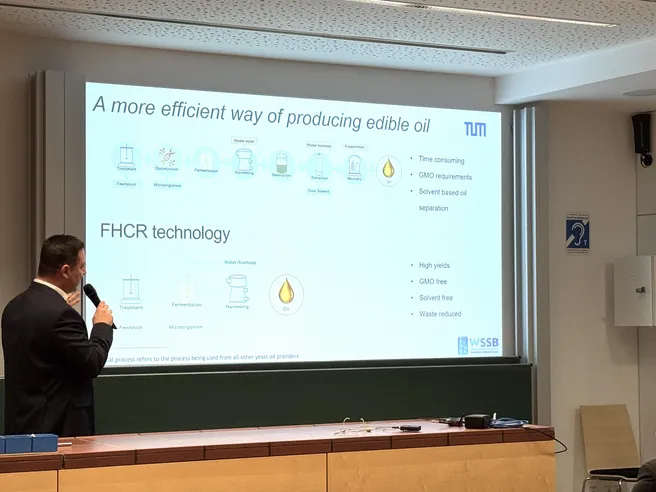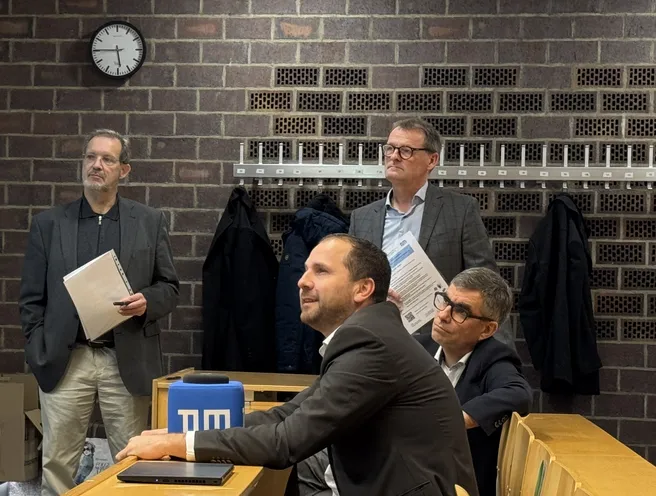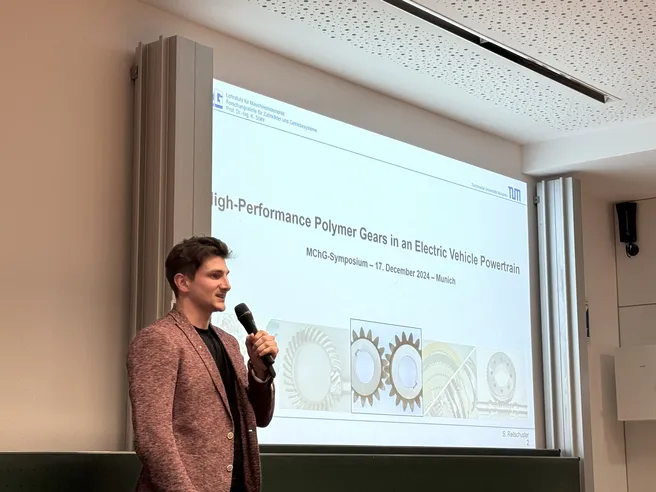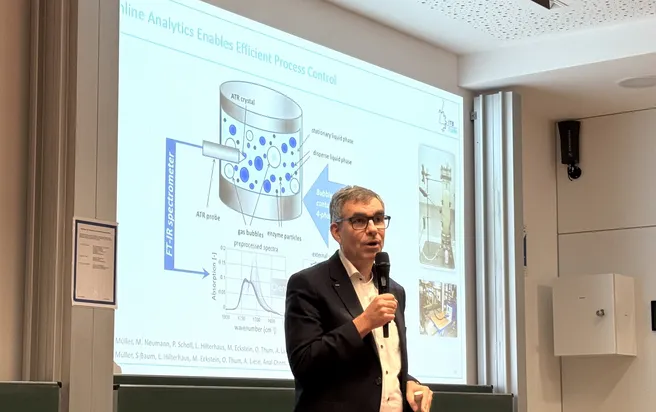On December 17, 2024, the Evonik MChG Symposium 2024 took place at the Technical University of Munich (TUM) under the theme “Applied Sustainability: Prominent Contributions from Tribology and Synthetic Biotechnology.” Organized by the Munich Chemical Society (MChG), Evonik Industries AG, TUM International GmbH, and the TUM School of Natural Sciences, the symposium brought together leading experts from academia and industry to discuss innovative approaches for a sustainable future.
Welcome and Opening
Prof. Richard Fischer (MChG) and Dr. Christoph Weckbecker from Evonik opened the event with words of gratitude and introduced the first session of the day. Prof. Fischer welcomed the attendees to the "Traditional Evonik Day" and handed over to Prof. Tom Nilges, Department Head Chemistry, who highlighted the longstanding collaboration between TUM and Evonik.
Biotechnology: Innovations for Climate Protection
The lecture series began with a presentation by Prof. Thomas Brück (TUM, Werner Siemens Chair of Synthetic Biotechnology). In his talk, “Whole cell conversion of greenhouse gases and industrial waste biomass into platform compounds for the chemical industry,” he highlighted innovative approaches to converting greenhouse gases and industrial biomass into chemically significant building blocks.
“Climate change is one of the issues that gets me out of bed in the morning,” Prof. Brück explained.
Prof. Brück emphasized the importance of the TUM AlgaeTec Center and the European research initiative Horizon Europe, in which Evonik is a participant, in driving the development of sustainable solutions. The project is named Valuable - "Valorization of fungal biomass using novel enzymatic technologies" and has been funded as an "Innovation Action" under the Horizon Europe program with €6 million. The chair of Prof. Brück serves as the coordinator of the consortium.
Fungal biomass can be used to produce chitin for the cosmetics and adhesive industries. The remaining glucans are converted into yeast oil through fermentation, which serves as a base material for acrylic resins in the furniture and coatings sectors, as well as an ingredient in cosmetics, effectively replacing environmentally harmful palm oil.
During the course of this project, four new marketable products have been developed. The Brück research group at the TUM NAT School has thus achieved a direct and sustainable impact on the market and product development in the fields of cosmetics and materials.
Dr. Jakob Müller (Evonik Operations GmbH) followed with his presentation, “Biotechnology as a game changer for the cleaning and cosmetics industries.” He underlined how biotechnology has the potential to transform these sectors. Replacing fossil raw materials with renewable carbon sources is essential for creating closed loops. Natural surfactants were cited as a particularly promising example.
High-Performance Polymers and Tribological Applications
The second session focused on innovative materials and their applications. Philipp Kilian (Evonik Operations GmbH) presented the properties of the high-performance polymer PEEK (polyether ether ketone), which is not only energy-efficient but also temperature-stable (“PEEK for energy efficient and silent transmissions”). This material plays a key role in reducing vibrations and in tribological applications, among other areas. Building on this, Stefan Reitschuster (TUM, Institute of Machine Elements) highlighted the advantages of plastic gears for electrically powered vehicles in his lecture ("High-Performance Plastic Gears to Run Battery-Electric Vehicles"). His research, including work on a Renault Twizy, emphasized the potential of polymers such as PEEK, while also addressing challenges such as temperature-dependent stiffness.
Biocatalysis: Sustainability in Fine Chemistry
Another highlight was delivered by Prof. Andreas Liese from the Hamburg University of Technology (TUHH), who spoke about biocatalysis as a key technology for sustainable chemical syntheses (lecture title: “Biocatalysis-Driven Sustainability in Fine Chemical Synthesis”). He advocated for using nature as a model and promoting solvent-free processes. "Process intensification drives sustainability forward," he explained, emphasizing the importance of fostering young talent in interdisciplinary fields.
In conclusion, Dr. Christoph Weckbecker and Prof. Richard Fischer thanked all the participants and particularly acknowledged the contributions from Evonik. During the informal wrap-up in the cafeteria of the Department of Chemistry, guests had the opportunity to deepen the discussions of the day.
The Evonik MChG Symposium 2024 clearly demonstrated how interdisciplinary approaches from biotechnology can contribute to solving key sustainability challenges. With a clear focus on practical applications, the event showcased how research and industry can jointly pave the way for a greener future.
Additional information & links:
- EVONIK Industries
- Münchener Chemische Gesellschaft (MChG)
- TUM International GmbH
- Prof. Thomas Brück
- Prof. Andreas Liese
Press contact





